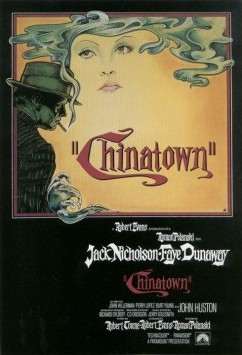
Back الحي الصيني (فيلم) Arabic الحى الصينى ARZ Кітайскі квартал (фільм) Byelorussian Кітайскі квартал (фільм) BE-X-OLD Китайски квартал (филм) Bulgarian চায়নাটাউন Bengali/Bangla Kineska četvrt (film) BS Chinatown (pel·lícula) Catalan Čínská čtvrť (film) Czech Chinatown (film) Danish
| Chinatown | |
|---|---|
 Theatrical release poster by Jim Pearsall | |
| Directed by | Roman Polanski |
| Written by | Robert Towne |
| Produced by | Robert Evans |
| Starring | |
| Cinematography | John A. Alonzo |
| Edited by | Sam O'Steen |
| Music by | Jerry Goldsmith |
Production companies |
|
| Distributed by | Paramount Pictures |
Release date |
|
Running time | 131 minutes[1] |
| Country | United States |
| Language | English |
| Budget | $6 million[2] |
| Box office | $29.2 million[3] |
Chinatown is a 1974 American neo-noir mystery film directed by Roman Polanski and written by Robert Towne. It stars Jack Nicholson and Faye Dunaway, with supporting performances from John Huston, John Hillerman, Perry Lopez, Burt Young, and Diane Ladd. The film's narrative, set in 1930s Los Angeles, is loosely inspired by the California water wars—early 20th-century conflicts over water rights that enabled Los Angeles to access resources from the Owens Valley.[4] Produced by Robert Evans and distributed by Paramount Pictures, Chinatown was Polanski's final film made in the United States and is considered a landmark of the film noir genre, blending mystery and psychological drama.[5]
Released on June 20, 1974, Chinatown received widespread critical acclaim for its direction, screenplay, cinematography, and performances—particularly those of Nicholson and Dunaway. Chinatown led the 47th Academy Awards with 11 nominations, including Best Picture, Best Director (Polanski), Best Actor (Nicholson), and Best Actress (Dunaway), with Towne winning for Best Original Screenplay.[6] At the 32nd Golden Globe Awards, the film received a leading 7 nominations, including Best Actress in a Motion Picture – Drama (Dunaway) and Best Supporting Actor – Motion Picture (Huston), and won a leading 4 awards, including Best Motion Picture – Drama, Best Director and Best Actor – Motion Picture Drama (Nicholson).[7] It also received a leading 11 nominations at the 28th British Academy Film Awards, including BAFTA Award for Best Film, BAFTA Award for Best Actress in a Leading Role and BAFTA Award for Best Actor in a Supporting Role, and won a leading 3 awards – Best Direction (Polanski) and Best Actor in a Leading Role (Nicholson).[8] In 2008, the American Film Institute ranked it #2 on its list of the top ten mystery films. In 1991, it was selected for preservation in the United States National Film Registry by the Library of Congress for being "culturally, historically, or aesthetically significant."[9][10] It is widely regarded as one of the greatest films ever made.[11][12][13]
A sequel, The Two Jakes, was released in 1990, with Nicholson reprising his role and directing. Towne returned as screenwriter, but the film received mixed reviews and failed to replicate the success of its predecessor.
- ^ "Chinatown (15)". British Board of Film Classification. Archived from the original on January 25, 2024. Retrieved January 25, 2024.
- ^ "Film History Milestones – 1974". Filmsite.org. Archived from the original on August 27, 2015. Retrieved July 9, 2015.
- ^ "Chinatown (1974)". Box Office Mojo. Archived from the original on January 28, 2012. Retrieved January 17, 2012.
- ^ "Barringer, Felicity. 'The Water Fight That Inspired Chinatown' in The New York Times". April 25, 2012. Archived from the original on July 28, 2020. Retrieved February 10, 2020.
- ^ Wasson, Sam. The Big Goodbye. Chinatown and the Last Years of Hollywood, Flatiron Books, 2020.
- ^ "The 47th Academy Awards | 1975". www.oscars.org. October 6, 2014. Retrieved April 12, 2025.
- ^ Villanueva, Armando (November 23, 2022). "1975: A Turning Point". Golden Globes. Retrieved April 12, 2025.
- ^ "Film". Bafta. Retrieved April 12, 2025.
- ^ Kehr, Dave (September 26, 1991). "U.S. Film Registry adds 25 'Significant' Movies". chicagotribune.com. Archived from the original on June 17, 2020. Retrieved June 1, 2020.
- ^ D. McGinnis, Wayne (1975). "'Chinatown': Roman Polanski's Contemporary Oedipus Story". Film Quarterly. 3 (3): 249–251. JSTOR 43795625. Archived from the original on June 16, 2023. Retrieved June 16, 2023.
- ^ Pulver, Andrew (October 22, 2010). "Chinatown: the best film of all time". The Guardian. London. Archived from the original on October 10, 2017. Retrieved February 2, 2017.
- ^ "100 Greatest Films". Archived from the original on October 14, 2013. Retrieved December 10, 2010.
- ^ "Greatest film ever: Chinatown wins by a nose". The Sydney Morning Herald. October 24, 2010. Archived from the original on March 21, 2016. Retrieved December 10, 2010.